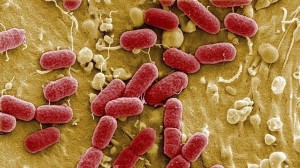Now that summer is finally here, I know that many of you are spending weekends outdoors, hiking, biking, camping or out by the pool. We experience such beautiful summers here in Ontario, that we definitely live them to their fullest! Outside time also means we enjoy taking our meals outdoors, which can mean a barbecue, a family picnic, or a camping stove.
Pros to eating your meals outside
- Sense of community
- Trying new and light dishes, cool summer salads, ice-cream made in your ice-cream maker
- On a grill, it’s difficult to argue about eating your vegetables when they are smoked to deliciousness!
Cons to eating your meals outside
- Food can be exposed to hot temperatures longer than is safe and can lead to the growth of bacteria on food (e.g. mayonnaise-containing sandwiches like tuna, egg, or salmon and even potato salad)
- Meat cooked on a barbecue may not be cooked to the proper temperature and may be containing bacteria like salmonella or E.coli that will be ingested
- Meat and vegetables cooked on a barbecue and charred (to give that often great smoky flavour) have carcinogens found in the carbon material (that is the black material on the meat)
- Points 1 and 2 above can lead to gastroenteritis
Gastroenteritis prevention
Gastroenteritis is a condition in which our digestive tract has an invasion (or in some cases an overexposure or overgrowth) to bacteria, viruses, or parasites that should not normally be present at certain levels or at all in the small and large intestine. To cope with this change in our intestinal flora, the body is adept in rejecting these foreign microorganisms. To us, this means gas, cramping, gurgling, and rapid elimination of the offending material(s). This is not a pleasant experience, but is adaptive! If we did not eliminate these microorganisms, we could become very, very ill.
This summer if you experience gastroenteritis, there are a few things that are important to have on hand:
- Hydrating fluids or electrolytes like Gatorade or for children, Pedialyte, help to replenish not only lost water from the colon but also important ions such as magnesium, sodium, and potassium that are lost in very liquid diarrhea.
- Probiotics or good bacteria always present in our gastrointestinal tract need to be replenished with gastroenteritis not only to slow down the speed of fluid out of the colon, but to help to re-establish the normal flora balance. Good bacterial populations in our digestive constitute multiple strains (Lactobacillus lacti, Bifidobacterium lactis, Lactobacillus GG, Lactobacillus acidophilus, Lactobactillus rhamnosus are just a few of these billion colonies) and help to “fight” against the presence of a foreign invader.
- L-glutamine is an amino acid (this is a term for a building block for protein) that is often used by our enterocytes (cells in the intestine) to grow, repair and heal. It helps to soothe the damage. Similarly, slippery elm (latin: ulmus rubra) is a herb that not only coats the digestive tract with a slimy layer to protect it and heal inflammation, it also promotes the adherence and growth of good bacteria vital to the digestive tract.
Serious complications of gastroenteritis
Watch out for a fever, vomiting and diarrhea for longer than 48 hours (in adults) as this is severely dehydrating. In children and elderly individuals, keeping an eye out for dehydration signs of dry skin and mouth, confusion or delirium, decreased sweating or tears should be monitored as this may arise earlier. Keeping a pharmaceutical anti-diarrheal on hand may be important to slow down your bowel transit time. Blood in the stool is not considered normal and you may want to seek help from your doctor at a walk-in clinic or at the hospital.
Ways to avoid gastroenteritis
- Make sure you bring a meat thermometer when camping, and have one on hand at home at all times. Undercooked chicken and pork deliver intense gastroenteritis, beef less so but still prevalent especially in homemade burgers.
- Keep your food cold or in a cooler, especially if with mayonnaise as this reduces the incidence of bacterial growth.
- Keep a good probiotic on hand in the summer. Probiotics are best kept in the refrigerator as the cultures are live, and if your probiotic bottle is not in the fridge (unless it is a soil-cultured strain) it is not good enough! Throw it out and get something better.
- Keep hydrated as much as you can. If diarrhea or vomiting hits, then you are not in as much danger as when you are dehydrated from sun-exposure or alcohol consumption.
Above all, have fun and use your common sense!
